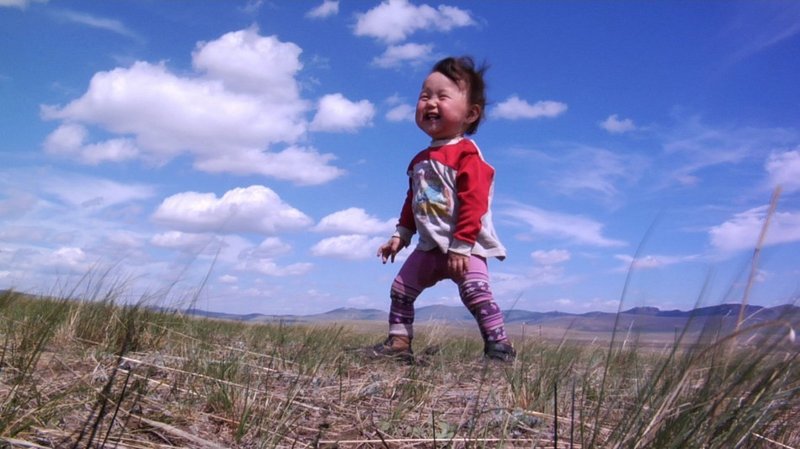In the joyous and buoyant new documentary “Babies,” the filmmakers keep the baby – and the bathwater – and everything else about infants that makes them so appealing that the rest of us keep making more of them.
Like the trailer that has been charming audiences for months, this is babyhood airbrushed to a high gloss. Squalls are few, colic doesn’t exist, neither does disease, diaper rash or diapers at all for that matter as director Thomas Balmes traces the first year in the lives of four infants from four corners of the world.
It is both a strength and a weakness that beyond the normal spills that come with sitting, crawling, walking and other early milestones, there is not one truly difficult moment that darkens the screen. If anything, the sweet-smelling “Babies” is the complete opposite of the conflict-riddled reality media world that dominates these days. The “awww” without the “shock” definitely makes “Babies” a very huggable movie experience, just not a primer on parenthood.
Our stars here are Ponijao from Namibia, Mari in Tokyo, Hattie from San Francisco and Bayarjargal, the only boy in the bunch, from Mongolia. We meet them at birth or soon after with Hattie’s short hospital stay, her body wired to countless high-tech machines, a reminder of how fragile life can be. Sturdy too, as Bayar is strapped up papoose style just hours after birth for the motorcycle trip back to the pasture where the family’s cattle graze.
Circumstances range from primitive – Ponijao’s family is part of an extended rural Himba tribe – to the urban affluence of Tokyo and San Francisco. It’s a testament to the fundamental adorableness of infants that all were “cast” before they were born and are universally photogenic. Even so, stars will always emerge and Ponijao and Bayar, whose lives are virtually untouched by modern conveniences or modern parenting, prove to be major scene-stealers who could have carried the film on their own.
The director has said one of the main characteristics he wanted in the families he would follow was that the child would be loved. That is perhaps the most significant truth of the film: Children surrounded by love are likely to thrive and are delightful to observe.
Even though these are beautiful babies, there is an art to creating images that are both provocative and powerful, and in that the director is skilled. A good thing since there is no narrative, no script, no statistics — just coos, gurgles, laughter and the occasional scream. Thankfully actions do speak louder than words, with Mari’s tantrum over mastering the stacking toy of doughnut-shaped wooden circles is all that needs to be said about frustration. The lack of language, for the subjects and the film itself, also keeps any larger messages about the real task of having and raising babies at bay.
That is not to say there is no story. Balmes, editors Craig McKay (“Reds,” “The Silence of the Lambs”) and Reynald Bertrand (“La Creme”), and music by Bruno Coulais (“Coraline”) create a nearly perfectly paced window into an infant’s evolution. The filmmakers stay with each baby long enough to capture their individuality and switch at the right moments to underscore how certain experiences are alike no matter who or where you are – the day Bayar discovers his feet for instance.
For the French documentarian, “Babies” represents a significant shift in style and topic. Balmes began his career with the 1996 “Bosnia Hotel,” following U.N. peacekeepers from Kenya as they monitored the volatile Eastern European country. In the years since, he has examined a Nokia factory in China, a personal injury law firm in Connecticut and the Mad Cow crisis in India, where cows may be mad but they’re also sacred.
Although “Babies” is light and filled with laughter, the making of the film was labor-intensive, shooting for 400 days over two years, often 12-hour days yielding only one usable shot. Balmes relied on a digital camera and often virtually no crew to keep the babies’ environment as natural as possible.
The result is irresistible and possibly infectious. Childhood and child-rearing through Balmes lens is overflowing with love and free of disappointments and pain — oh, if it were only so.
Send questions/comments to the editors.



Success. Please wait for the page to reload. If the page does not reload within 5 seconds, please refresh the page.
Enter your email and password to access comments.
Hi, to comment on stories you must . This profile is in addition to your subscription and website login.
Already have a commenting profile? .
Invalid username/password.
Please check your email to confirm and complete your registration.
Only subscribers are eligible to post comments. Please subscribe or login first for digital access. Here’s why.
Use the form below to reset your password. When you've submitted your account email, we will send an email with a reset code.